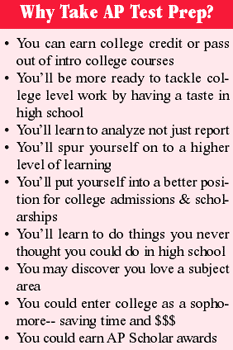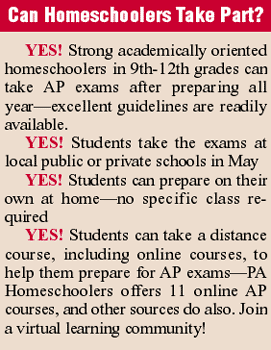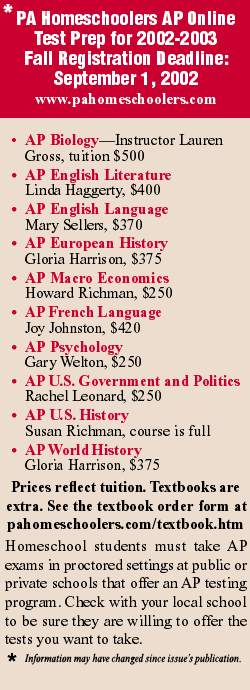Homeschoolers and Advanced Placement
By Howard and Susan Richman
Printed in Practical Homeschooling #48, 2002.
 Advanced Placement exams can have great benefits for a homeschooler's college career. Find out how it works and how to find an online course.
Advanced Placement exams can have great benefits for a homeschooler's college career. Find out how it works and how to find an online course.

|
 |
 It's been a long time since I first called the Advanced Placement office at the College Board way back in 1992, to ask if it was possible for homeschool students to take AP exams. The nice man I spoke to said he'd honestly never been asked the question before, but he didn't see why not - after all, any student was welcome to take these exams, which are used by colleges to decide if a student's high school program included college-level work eligible for college credit or for placement beyond introductory courses in the freshman year. Even school students were not required to take a specific AP course in a high school to take the exam - independent study was fine.
It's been a long time since I first called the Advanced Placement office at the College Board way back in 1992, to ask if it was possible for homeschool students to take AP exams. The nice man I spoke to said he'd honestly never been asked the question before, but he didn't see why not - after all, any student was welcome to take these exams, which are used by colleges to decide if a student's high school program included college-level work eligible for college credit or for placement beyond introductory courses in the freshman year. Even school students were not required to take a specific AP course in a high school to take the exam - independent study was fine.
And so I started making plans with our own son, Jesse. He prepared for the AP U.S. History exam with me during his junior year at home, earning a top score. The next year he aimed for AP Calculus, AP English Language, and AP Physics. Jesse headed into college with 18 credits from AP exam results. We've since then worked with two more of our own kids in AP preparation, and with homeschoolers all across the country and even living abroad through our online AP test preparation classes. Now instead of only a handful of homeschool students we know taking these challenging exams, literally hundreds are - and many more homeschoolers everywhere are realizing this is something they too can take part in. The benefits can be really broad.
 First, there's that enticing idea that you may be able to do college less expensively, by completing up to a year of college or even more through AP exams. Though the exams are not cheap, at $77 each, and guide books, texts, and preparation courses generally are more expensive than a typical high school course, this is still far less than taking a college course would cost. Some exams, such as AP U.S. History and AP English Literature, also typically count credit-wise as a two-semester course. None of my own three older kids actually used this option. They each valued being on campus a full four years. But their AP exam credits allowed them each to delve into more areas more quickly, and let each of them add on more diverse coursework. Jesse was able to double major in history and political science, and take wide-ranging electives; Jacob majored in Computer Science with minors in both math and physics.; Molly is contemplating a triple-major in English writing, psychology, and French, with possibly a Judaic studies minor. None of my kids would have had this sort of option if they hadn't already completed many requirements in basic areas through the AP program.
First, there's that enticing idea that you may be able to do college less expensively, by completing up to a year of college or even more through AP exams. Though the exams are not cheap, at $77 each, and guide books, texts, and preparation courses generally are more expensive than a typical high school course, this is still far less than taking a college course would cost. Some exams, such as AP U.S. History and AP English Literature, also typically count credit-wise as a two-semester course. None of my own three older kids actually used this option. They each valued being on campus a full four years. But their AP exam credits allowed them each to delve into more areas more quickly, and let each of them add on more diverse coursework. Jesse was able to double major in history and political science, and take wide-ranging electives; Jacob majored in Computer Science with minors in both math and physics.; Molly is contemplating a triple-major in English writing, psychology, and French, with possibly a Judaic studies minor. None of my kids would have had this sort of option if they hadn't already completed many requirements in basic areas through the AP program.
I do know homeschoolers who have appreciated the option of entering college as sophomores because of their AP credits. Often these are kids planning on grad school and advanced degrees, who really do want to think about shortening their total time in college.
 Next, doing well on AP exams can help put you in the running for both selective universities and honors colleges, and for substantial scholarship opportunities. Good test scores will never be the whole answer to winning the "big one," but they can be one tool to open the door to the possibility. The dean at the University of Pittsburgh Honors College, where my daughter Molly is now entering her junior year, shared that when Jesse had applied five years earlier, it was great and notable if a student had even one AP exam score on their application - but now competition is much stiffer, and virtually all the applicants for the Honors College top scholarship have multiple strong AP scores. If students have no AP scores, they simply might get passed over. While he regretted this, realizing that some wonderful students might not have had AP opportunities, he recognized this was the new reality. Molly had already passed four AP exams with top scores of 5 when she went in for her scholarship interview, with preparation for several more in the works for her senior year, and I'm sure this was one help in winning the wonderful full-ride scholarship she received.
Next, doing well on AP exams can help put you in the running for both selective universities and honors colleges, and for substantial scholarship opportunities. Good test scores will never be the whole answer to winning the "big one," but they can be one tool to open the door to the possibility. The dean at the University of Pittsburgh Honors College, where my daughter Molly is now entering her junior year, shared that when Jesse had applied five years earlier, it was great and notable if a student had even one AP exam score on their application - but now competition is much stiffer, and virtually all the applicants for the Honors College top scholarship have multiple strong AP scores. If students have no AP scores, they simply might get passed over. While he regretted this, realizing that some wonderful students might not have had AP opportunities, he recognized this was the new reality. Molly had already passed four AP exams with top scores of 5 when she went in for her scholarship interview, with preparation for several more in the works for her senior year, and I'm sure this was one help in winning the wonderful full-ride scholarship she received.
Then there is the fact that thorough preparation all year for a May AP exam can really make a homeschooler stretch in new ways to master a subject, giving them real and concrete goals to work for, and a real deadline for accomplishment. Regardless of the score earned on the exam, the student will have realized the type of planning, effort, and perseverance it takes to be strong in a field - and they'll be that much more ready for real college coursework. The College Board provides very clear guidelines on just what types of skills, content coverage, and level of analysis will be required on each exam. Real analysis and production is required. Students must write analytical essays; solve complex calculus and physics problems, showing all steps in clear proofs; read, speak, listen to and write in their foreign language; listen to and compose music; actually create a portfolio of art work or respond in essays to slides presented from art history. It's a new level of challenge, yet a very clear one, and one that many homeschoolers are meeting.
Now, with all of these benefits, how do you go about preparing in the best way? The College Board has an incredibly helpful website devoted to AP coursework, showing many sample back exam questions, student essays ranked at different levels, and clear goals and expectations for each exam. For a growing number of exams the College Board also has excellent CD-ROM preparation programs. There are also study guides from the major test-prep publishers: Barron's, Princeton Review, Kaplan, Arco, Cliff, and more. There are suggested college-level texts listed on the College Board site, showing the types of books often used in either college courses in this area or in AP courses in high schools. Using these resources, a family can readily map out a sound strategy for a full-year course at home.
 There are also more and more online test preparation courses available, and some homeschooling co-op groups are focusing their work at providing preparation for AP exams. At Pennsylvania Homeschoolers, we are moving into our seventh year of helping homeschool students in AP test preparation. One of the ways that an online test prep course can really help is in keeping a student on-track with assignments, helping give those deadlines all along the way that will insure that a student is ready and prepared by May. After all, it's no good being set for AP U.S. History in July, when the exam is in May - and only in May. In most of our online courses there are also options for students to respond to one another's work, take part in lively discussions of course content, get personal feedback from their teacher, and really get to know their fellow learners. Teachers often are available to write college recommendation letters too for especially strong students, as they really get to know a student's academic capabilities and character through their interactions online.
There are also more and more online test preparation courses available, and some homeschooling co-op groups are focusing their work at providing preparation for AP exams. At Pennsylvania Homeschoolers, we are moving into our seventh year of helping homeschool students in AP test preparation. One of the ways that an online test prep course can really help is in keeping a student on-track with assignments, helping give those deadlines all along the way that will insure that a student is ready and prepared by May. After all, it's no good being set for AP U.S. History in July, when the exam is in May - and only in May. In most of our online courses there are also options for students to respond to one another's work, take part in lively discussions of course content, get personal feedback from their teacher, and really get to know their fellow learners. Teachers often are available to write college recommendation letters too for especially strong students, as they really get to know a student's academic capabilities and character through their interactions online.
There are also a growing number of other online options for AP test preparation. One of the best known, for both school students and homeschoolers, is APEX Learning. It's especially exciting to see that APEX has now expanded their special 11 AP Review prep courses, which give students a special boost right in the last two month of study. My own AP U.S. History online students really appreciated using this as a supplement to our class. Those from PA actually could use the APEX Exam Review site for free as the PA Dept of Education had signed on with APEX Learning so that all Pennsylvania students, whether in public, private, or homeschools, could use this fine service free from March 1st to their exam date in May. Many other states are also now offering this option to students. Even if your state does not, the fee was only $59 per student this past year, for two solid months of unlimited online learning options: diagnostic tests, quizzes, help with free response essay sections, overview of the content to be mastered, and more.
Some colleges also offer AP online test prep courses. I especially recommend the University of Oklahoma for AP Calculus (both AB and BC levels) and AP German, two test prep courses that neither PA Homeschoolers nor APEX Learning offer. See k12.okstate.edu for full info. Further, the well-known online homeschool program, the Institute for the Study of the Liberal Arts and Sciences (ISLAS www.islas.org) is also now offering both AP English Literature and AP Latin, as more of their students are ready for this level of work. Mary Ann P. DiEdwardo also continues to offer a range of AP online test prep courses through www.maryannwriting.com.
So look into the Advanced Placement program, and find a way to prepare that will work for your family. You just may find that it inspires your homeschooler to set high goals and really achieve.